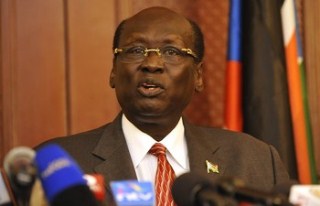South Sudan plans major diplomatic reforms
October 10, 2013 (JUBA) – A major diplomatic reform is underway in South Sudan foreign ministry following a spate of public outcry on the way it handles the country’s international affairs, a senior diplomat said.

“There remains a lot of work to be done and it is imperative that the ministry devise policies reflective of the law and priorities of the government”, Magok Rundial, the assembly speaker, said.
The foreign affairs ministry, he said, should embark on sustained efforts aimed at creating awareness globally on the country’s independence status.
“There are countries which still do not know that we [South Sudan] are [an] independent state up to this moment. Such a challenge requires aggressive and playing strong role with skilled and effective diplomats”, stressed Rundial.
The speaker made these remarks Wednesday as lawmakers were scrutinising activities of each ministry during the third reading of the 2013-2014 national budgets.
The young nation, in 2011, enacted the Diplomatic and Consular Service Act; a law intended to simplify decision making processes and give it more access to international affairs.
The law, which became operational in January last year, allows the country to establish embassies in key countries and permanent missions at the regional and international organisations, including having temporary missions defined by needs.
It also provides for the establishment of consulates, to be run by ambassadors, minister plenipotentiaries, counselors and categorised sizable secretaries.
South Sudan currently comprises 22 embassies in various countries.
However, despite numerous efforts by government to effectively manage its international relations, critics have argued that the foreign affairs ministry has failed to live up to their expectations.
Some of the embassy employees, they alleged, lacked the much-needed diplomatic skills to sell and establish strong relations with key influential and power nations.
But the foreign ministry, despite all these concerns, says it remains committed to establish strong foreign policies.
Last month, the foreign affairs minister formed a technical committee to study how it could improve relations with other countries by deploying competent workforce in line with the policy of lean, but effective cadres to run the show to public expectations.
The committee, the foreign affairs spokesperson told Sudan Tribune, was still carrying out studies so as to come up with recommendations on which the government would take “necessary actions” to improve relations with other nations.
The Consular Service Act, Mawien Makol said, established a council, which serves as an advisory board to the minister.
“The Council shall advise the minister either upon his or her request or on its own motion, on matters of foreign policy and may evaluate performance and recommend measures for improving diplomatic or foreign policy performance by the ministry”, the act reads in part.
According to Makol, the number of diplomats deployed at the 22 embassies needed to be reduced to reflect the government policy of lean, but effective diplomatic cadres.
“The committee has up to the end of this month [to] produce the report. It is now evaluating the number of our diplomats in [places] where they have been deployed and [will] make recommendations on which the government would take necessary actions”, said the senior diplomat.
It is expected that each embassy would have at least four to six diplomats, [but] now there are about nine to ten in one embassy,” he added.
The committee, the foreign affairs spokesperson said, is also conducting background checks of individual diplomats, examining specifically their areas of specialty, experiences, capabilities and level of understanding of diplomatic and international affairs,
“These are very important areas to be assessed because there is a general feeling that our diplomats were not appointed on the basis of their merits, but through backdoors. Some of them have also been reported to be too emotional, which portrays negative image of the country,” he told Sudan Tribune.
Some envoys, another senior diplomat said, were appointed for diplomatic service having played active roles during the war time, but had no prior training on diplomacy and foreign relations.
“They certainly did good work by helping bring to the spotlight what our people were undergoing, but not activists are good diplomats”, he explained.
Our system should discourage this practice. They will do well somewhere else, he added.
South Sudan currently has more than 90 ambassadors, some of whom have not been assigned anywhere.
(ST)
